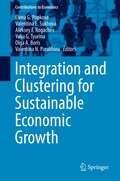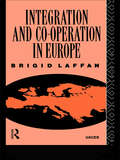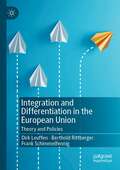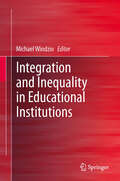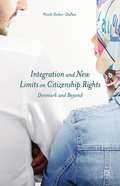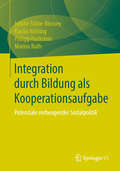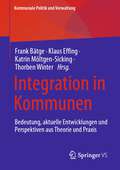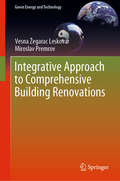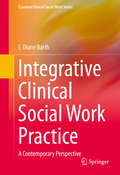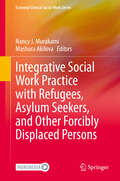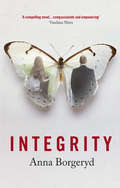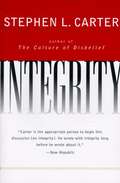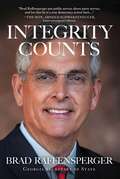- Table View
- List View
Integration Through Law: ASEAN as an Actor in International Fora
by Jürgen Rüland Nguitragool, Paruedee and Rüland, Jürgen Paruedee NguitragoolASEAN as an Actor in International Fora addresses a blind spot in ASEAN research and in comparative regionalism studies by assessing why, how, when and to what extent ASEAN member governments achieve a collective presence in global fora. Written for academic researchers and practitioners working in areas such as international relations, political science and international law, it examines ASEAN's negotiating behavior with a novel four-point cohesion typology. The authors argue that ASEAN's 'cognitive prior' and its repository of cooperation norms have affected ASEAN's negotiation capacities, formats, strategies and cohesion in international fora. Using two case studies - one on ASEAN's cohesion in the WTO agricultural negotiations and one on UN negotiations on forced labor in Myanmar - they examine ASEAN's collective actions at different stages of negotiation, in different issue areas and in different negotiating fora. The book concludes by providing recommendations for strengthening ASEAN's international negotiation capacities.
Integration Through Law: Comparative Regional Integration
by Carlos Closa Lorenzo CasiniComparative Regional Integration: Governance and Legal Models is a groundbreaking comparative study on regional or supranational integration through international and regional organizations. It provides the first comprehensive and empirically based analysis of governance systems by drawing on an original sample of 87 regional and international organizations. The authors explain how and why different organizations select specific governance processes and institutional choices, and outline which legal instruments – regulatory, organizational or procedural – are adopted to achieve integration. They reveal how different objectives influence institutional design and the integration model, for example a free trade area could insist on supremacy and refrain from adopting instruments for indirect rule, while a political union would rather engage with all available techniques. This ambitious work merges different backgrounds and disciplines to provide researchers and practitioners with a unique toolbox of institutional processes and legal mechanisms, and a classification of different models of regional and international integration.
Integration Through Law: From Community to Compliance?
by Simon ChestermanIn the past decade, the Association of Southeast Asian Nations (ASEAN) has transformed from a periodic meeting of ministers to setting ambitious goals of becoming a Community by 2015. ASEAN is now the most important regional organisation in the history of the continent of Asia. An important tension in this transformation is the question of whether the 'ASEAN way' - defined by consultation and consensus, rather than enforceable obligations - is consistent with the establishment of a community governed by law. This book examines the growing interest in following through on international commitments, in particular monitoring implementation and compliance. Key barriers remain, in particular the lack of resources and ongoing resistance to accepting binding obligations. It remains to be seen whether these trends herald a more measured approach to decision-making in ASEAN. Written for practitioners and researchers alike, this important book provides the first systematic survey of monitoring within ASEAN.
Integration Through Law: From Treaty-making to Treaty-breaking
by Kuijper, Pieter Jan and Mathis, James H. and Morris-Sharma, Natalie Y. Pieter Jan Kuijper James H. Mathis Morris-Sharma, Natalie Y.From Treaty-Making to Treaty-Breaking is the first high-level analysis of ASEAN's external trade agreements with non-ASEAN states. It clearly sets out the intended, and unintended, consequences of ASEAN's prevailing method of treaty making, with suggested guidelines for the future. The book begins by asking whether ASEAN trade agreements follow worldwide trends in the substantive content of such agreements. It raises questions such as: to what extent is it possible to continue concluding trade agreements through individual member states?; what are the legal consequences - from negotiation and conclusion (treaty-making) through to possible breach of the agreements (treaty-breaking)?; should ASEAN resort to mixed treaty-making? This study does not seek to give a definitive answer to these questions, rather it opens up the topic to readers by suggesting different possible models for ASEAN trade agreements. This thought-provoking book will appeal to anyone interested in trade negotiations and trade agreements, particularly in Asia.
Integration Through Law: Promoting Compliance
by Beckman, Robert and Bernard, Leonardo and Phan, Hao Duy and Hsien-Li, Tan and Yusran, Ranyta Robert Beckman Leonardo Bernard Hao Duy Phan Tan Hsien-Li Ranyta YusranThe reputation and achievement of the ASEAN Community hinges on compliance. This seminal book discusses whether ASEAN's faith in dispute settlement and monitoring mechanisms as a means to better compliance is justified and delves into the extent to which they can facilitate ASEAN Community building. It provides the first comprehensive and systematic analysis of ASEAN's compliance with its instruments, and enables readers to see ASEAN as an organisation increasingly based on law and institutions. Readers will also learn how ASEAN balances a thin line between law and institutions on the one hand and diplomacy and realism on the other. Scholars of adjudicatory mechanisms will find this book a fascinating addition to the literature available, and it will serve as a 'go-to' reference for ASEAN state agencies. The book will also interest academics and practitioners working on comparative and cross-disciplinary studies of dispute settlement, monitoring mechanisms, compliance, and international and regional organisations.
Integration Through Law: Sustainable Goals?
by Robinson Kheng-Lian Koh Nicholas A. Lin-Heng LyeWhile the environmental performance of most ASEAN member states is above the world average, ASEAN nations will continue to face growing environmental challenges due to pressures exerted on them such as population growth, urbanization and industrialization. The authors of this book look at how the member states of ASEAN employ law as a means of regional integration within the context of environmental conservation. While the goal of new laws is to implement sustainable development, it continues to be an ongoing adaptive process, since clear and immediate answers to environmental challenges are rarely available. Readers of this book will gain a clear idea of the evolving cooperation for sustainability within ASEAN at regional and global levels, and the areas of focus for the future. The book will be of interest to policy and decision makers, as well as environmental organizations and academics in the field.
Integration Through Law: The ASEAN Economic Community
by Jacques PelkmansThe Association of Southeast Asian Nations (ASEAN) has experienced rapid economic growth for many years. Although the population of ASEAN is larger than the EU-28, the emerging ASEAN market, called the ASEAN Economic Community (AEC), is still little understood by policy makers in many parts of the world, by business professionals and students, as well as by scholars in economics, business, politics and economic law. This book provides, for the first time, a rigorous analytical approach of the new AEC and its intricacies. It sets out its ambition, scrutinises its economic integration logic and detects its deficits. Besides a detailed analysis of the AEC Roadmap, the book also elaborates on its achievements. Several strategic economic options for the AEC, in particular as an instrument to accelerate the economic development of the region, are explored.
Integration Through Law: The Foundation of the ASEAN Economic Community
by Stefano Inama Sim Edmund W.ASEAN has undertaken the complex task of creating a single economic entity for Southeast Asia by 2015 in the form of the ASEAN Economic Community (AEC), but without regulators or supranational institutions, its implementation has been an inconsistent process. Through comparisons with the EU and NAFTA, this book illustrates the shortcomings of the current system, enabling readers to understand both the potential of regional economic development in ASEAN and its foundational and institutional deficiencies. The authors' analysis of trade in goods and services, investment, and dispute resolution in the AEC indicates that without strong regional institutions, strong dispute resolution or a set of norms, full and effective implementation of the AEC is unlikely to result. The book offers clear solutions for the ASEAN institutions to help the AEC reach its full potential. Written by two leading practitioners, this insightful book will interest policymakers, students and researchers.
Integration Through Law: The Internal Effects of ASEAN External Relations
by Venzke, Ingo and Thio, Li-ann Ingo Venzke Li-Ann ThioStarting with a typology of ASEAN external agreements, the authors go on to provide an original reading of plurilateral agreements as 'joint' agreements. The book then offers both a clarification of the effects - direct or indirect - of external agreements within the legal orders of ASEAN Member States, and an explanation of the effects of external agreements within the legal regime of ASEAN. The authors conclude with a discussion of the role of ASEAN centrality and the role of the secretariat in shaping it.
Integration Through Law: The Role of the Public Bureaucracy in Policy Implementation in Five ASEAN Countries
by Quah, Jon S. T.This pioneering book addresses an important gap in the literature by comparing the role of the public bureaucracies in policy implementation in Indonesia, Malaysia, the Philippines, Singapore and Vietnam. It highlights the importance of the policy context, especially the commitment of the government in allocating the necessary resources and the support of the implementers, as well as the public bureaucracy's effectiveness, as the critical factors responsible for effective policy implementation. The comparative analysis shows that the public bureaucracies in Singapore and Malaysia are more effective in policy implementation than their counterparts in Indonesia, the Philippines and Vietnam because of their favourable policy contexts and higher level of organizational effectiveness. The focus on policy context and the public bureaucracy's role in the policy-making process and its implementation of two ASEAN policies will be of interest to policymakers, civil servants, scholars and students concerned with enhancing policy implementation in the ASEAN countries.
Integration Through Law: Towards a Rules-Based Community
by Jean-Claude Piris Piris, Jean-Claude and Woon, Walter Walter WoonIn 2007, ASEAN adopted the ASEAN Charter, which stated its ambition to become a 'rules-based' community respecting the rule of law. In order to fulfil this objective, it is vital that the necessary legal infrastructure has effective legal support. This book helps readers to understand the need for and role of such a legal service. To begin with, it explores the way ASEAN and its various institutions have evolved. The current situation with respect to the making of rules and settlement of disputes is then analysed, drawing not only on published primary and secondary materials, but also on the experience of diplomats, officials and legal officers. Finally, the authors draw on their practical experiences, as former attorney-general of an ASEAN member state and former head of the European Council legal service, to make recommendations on how an ASEAN Legal Service might be organised.
Integration and Clustering for Sustainable Economic Growth (Contributions to Economics)
by Elena G. Popkova Valentina E. Sukhova Aleksey F. Rogachev Yulia G. Tyurina Olga A. Boris Valentina N. ParakhinaThis book describes the importance of integration and clustering in creating sustainable economic growth. Modern economic conditions demonstrate the need for governmental stimulation of cluster initiatives in entrepreneurship, and make it necessary to study the experience of developed countries in the sphere of stimulation of cluster initiatives in entrepreneurship, and to offer recommendations for improving the system of state stimulation of these initiatives. The authors conclude that at present, innovational economy is an economic system that functions on the basis of business networks, as this model offers innovational cooperation between specialists from various scientific and technical spheres, between organizations of various sizes (large, medium, and small), and between groups of various types of companies. Cluster strategy in modern global practice is one of the most important tools of public policy for increasing the competitiveness of national economies. This means that the most competitive spheres develop on the basis of the cluster principle, and support for cluster building increases a country’s economic competitiveness.
Integration and Co-operation in Europe
by Brigid LaffanAn ideal introductory text for students studying the EU, International politics and organisations, or economics: Laffan clearly explains the evolution and extent of European integration in areas ranging from industrial development to international relations and considers the problems that new political and economic demands from the East may raise.
Integration and Differentiation in the European Union: Theory and Policies
by Frank Schimmelfennig Dirk Leuffen Berthold RittbergerFar from displaying a uniform pattern, European integration varies significantly across policy areas and individual countries. Why do some member states choose to opt out of specific EU policies? Why are some policies deeply integrated whereas others remain intergovernmental? In this updated second edition, the authors introduce the most important theoretical approaches to European integration and apply these to the trajectories of key EU policy areas. Arguing that no single theory offers a completely convincing explanation of integration and differentiation in the EU, this thought-provoking book provides a new synthesis of integration theory and an original way of thinking about what the EU is and how it works.
Integration and Inequality in Educational Institutions
by Michael WindzioThis volume addresses questions that lie at the core of research into education. It examines the way in which the institutional embeddedness and the social and ethnic composition of students affect educational performance, skill formation, and behavioral outcomes. It discusses the manner in which educational institutions accomplish social integration. It poses the question of whether they can reduce social inequality, - or whether they even facilitate the transformation of heterogeneity into social inequality. Divided into five parts, the volume offers new insights into the many factors, processes and policies that affect performance levels and social inequality in educational institutions. It presents current empirical work on social processes in educational institutions and their outcomes. While its main focus is on the primary and secondary level of education and on occupational training, the book also presents analyses of institutional effects on transitions from vocational training into tertiary educational institutions in an interdisciplinary and internationally comparative approach.
Integration and New Limits on Citizenship Rights
by Nicole Stokes-DupassIntegration and New Limits on Citizenship Rights is a state-centered analysis of citizenship, immigration and social identity. It explores the increasing role of nation states as critical actors in using social policy to affect the social location of immigrants and ethnics and also to redefine what it means to be a full citizen.
Integration durch Bildung als Kooperationsaufgabe: Potenziale vorbeugender Sozialpolitik
by Sybille Stöbe-Blossey Karola Köhling Philipp Hackstein Marina RuthDas Buch enthält die Beschreibung und Ergebnisse der Studie „Kooperation von Akteuren vorbeugender Sozialpolitik. Eine Analyse am Beispiel der Berufsorientierung jugendlicher Flüchtlinge“. Auf der Basis eines theoretischen Rahmens zur Analyse von förderlichen und hemmenden Faktoren für Kooperation wurden qualitative Interviews mit lokalen Akteuren – Koordinierungsstellen, beruflichen Schulen, Jugendhilfe, Arbeitsverwaltung – geführt und ausgewertet. Der Band stellt Rahmenbedingungen, Probleme und Chancen für die Kooperation auf lokaler Ebene dar, gibt einen Einblick in die Praxis der Förderung von Integration durch Bildung und diskutiert Möglichkeiten für die (Weiter-)Entwicklung von Kooperation.Der Inhalt• Politikfeldübergreifende Kooperation in der vorbeugenden Sozialpolitik: Grundlagen • Kooperationen auf lokaler Ebene: Empirische Analysen am Beispiel der Berufsorientierung für jugendliche FlüchtlingeDie Autor_innenProfessor Dr. Sybille Stöbe-Blossey ist Abteilungsleiterin am Institut Arbeit und Qualifikation, Abteilung Bildung und Erziehung im Strukturwandel (BEST), der Universität Duisburg-Essen. Dr. Karola Köhling, Philipp Hackstein und Marina Ruth sind wissenschaftliche Mitarbeiter_innen am Institut Arbeit und Qualifikation, Abteilung Bildung und Erziehung im Strukturwandel (BEST), der Universität Duisburg-Essen.
Integration in Kommunen: Bedeutung, aktuelle Entwicklungen und Perspektiven aus Theorie und Praxis (Kommunale Politik und Verwaltung)
by Katrin Möltgen-Sicking Thorben Winter Frank Bätge Klaus EffingDieses Buch greift ein Thema auf, das sowohl für die kommunale Praxis als auch für die Forschung von aktueller Relevanz ist: die Integration in Kommunen. Neben Themen von allgemeiner Bedeutung wird auch die organisatorische Perspektive der Integration in Kommunen behandelt. Die Teilhabe und Partizipation bildet einen weiteren Themenschwerpunkt des Bandes. Nicht zuletzt wird die Integration in der kommunalen Praxis unter verschiedenen Blickwinkeln beleuchtet und diskutiert.
Integration through Law: Asean's External Agreements
by Marise, Cremona and Kleimann, David and Larik, Joris and Lee, Rena and Vennesson, Pascal Cremona Marise David Kleimann Joris Larik Rena Lee Pascal VennessonASEAN is coming of age as an international actor and international treaty-maker. To date, more than two hundred external agreements and other instruments have been concluded in the name of ASEAN. This book provides the first systematic account of the legal framework governing ASEAN's burgeoning external relations practice. It focuses in depth on ASEAN's wide-ranging mandate to promote its values and principles in the wider region and beyond, as well as the highly intergovernmental, and at times haphazard, handling of the bloc's relations with the outside world. Furthermore, it reveals that there are two basic meanings of ASEAN in its international dealings, which have important implications under international law: ASEAN as an international organisation with its own legal personality and ASEAN as the collectivity of its member states. This timely and thoughtful book is a valuable resource for practitioners and scholars of international law, ASEAN law, international relations, regional integration and governance.
Integrative Approach to Comprehensive Building Renovations (Green Energy and Technology)
by Miroslav Premrov Vesna Žegarac LeskovarThis book presents a new approach to building renovation, combining aspects of various professional disciplines, integrating green building design, structural stability, and energy efficiency. It draws attention to several often-overlooked qualities of buildings that should be comprehensively integrated into the context of building renovation.The book presents an overview of the most important renovation approaches according to their scope, intensity, and priorities. Combining basic theoretical knowledge and the authors’ scientific research it emphasizes the importance of simultaneous consideration of energy efficiency and structural stability in building renovation processes. It simultaneously analyses the effects of various renovation steps related to the required level of energy efficiency, while it also proposes the options of building extension with timber-glass upgrade modules as the solution to a shortage of usable floor areas occurring in large cities.This book offers building designers and decision makers a tool for predicting energy savings in building renovation processes and provides useful guidelines for architects, city developers and students studying architecture and civil engineering. Additionally, it demonstrates how specific innovations, e.g., building extensions with timber-glass modules, can assist building industry companies in the planning and development of their future production.The main aim of the current book is to expose various approaches to the renovation of existing buildings and to combine practical experience with existing research, in order to disseminate knowledge and raise awareness on the importance of integrative and interdisciplinary solutions.
Integrative Clinical Social Work Practice
by F. Diane BarthIn recent history the practice of medicine and mental health has been increasingly eclectic as more and more practitioners harness seemingly disparate therapies and techniques to arrive at clinical breakthroughs. But while social work professionals have been involved in integrative practice informally and intuitively for years, resources to bring structure to this therapeutic concept have been few and far between. In response, Integrative Social Work Practice offers innovative ways of conceptualizing cases, communicating with clients and making better therapeutic use of client individuality. Rich in research, evidence-based and clinical material from a variety of settings, the book begins with the basic organizing principles behind effective integrative practice. Real-world examples flesh out the theoretical rationales and psychodynamic, cognitive, behavioral and developmental methods are shown in practical context. The author also demonstrates how to balance flexibility and boundaries and manage diverse and even conflicting theories, while providing clear guidelines on: Integrating key psychotherapeutic approaches into social work. Using somatic knowledge to enhance therapy. Making assessments and choosing interventions. Applying an integrative approach to therapeutic relationships. Creating manageable goals based on small steps. Building and working with an integrative team. An important step forward in both professional development and the larger therapeutic picture, Integrative Social Work Practice benefits researchers and practitioners as well as supervisors and students in social work and counseling.
Integrative Social Work Practice with Refugees, Asylum Seekers, and Other Forcibly Displaced Persons (Essential Clinical Social Work Series)
by Nancy J. Murakami Mashura AkilovaThis textbook provides theoretical and clinical knowledge needed by social workers and other practitioners involved in humanitarian emergency response. Social workers are well positioned to serve coordinating and leadership roles in this interdisciplinary field due to their holistic training. This book weaves together micro, mezzo, and macro levels of practice into integrated social work practice. Its historical account of humanitarian emergencies, coverage of social work frameworks and principles, and review of existing best practices at the clinical, community, and policy levels ground the reader in a field of social work that requires consideration of historical frameworks alongside innovative responses to the complexity of humanitarian emergencies.The contributors incorporate best practices as well as address gaps in awareness, knowledge, and skills that they have observed and studied worldwide. Some of the topics explored include:Social Work with Displaced Children, Women, LGBTQI+, Asylum SeekersReturn and Reintegration of Displaced Populations and Reconstruction in Post-conflict SocietiesCulture, Trauma, and Loss: Integrative Social Work Practice with Refugees and Asylum SeekersClinical Social Work Practice with Forcibly Displaced Persons Grounded in Human Rights and Social Justice PrinciplesIntegrative Social Work Practice with Refugees, Asylum Seekers, and Other Forcibly Displaced Persons is adoptable as a primary text for MSW and doctoral elective courses on global social work or international social work practice with persecuted and forcibly displaced people. This textbook is targeted to clinical social work or policy courses as well, and can be supplemental reading for required courses for migration and forced displacement majors. It is also useful for social workers or interdisciplinary practitioners working around the globe with displaced populations.
Integrity
by Cynthia Kite Anna BorgerydVera is a nurse from Sweden who, while delivering a dangerous birth in the Colombian jungle, makes contact with indigenous people who give her a wholly different outlook on life.<P><P> A traumatic experience takes her home, her life in pieces, just like the world as she now sees it. Her quest to put her life back together becomes tied up with her vision of a more sustainable world.She meets the corporate heir to a company specializing in luxury travel who has a predatory attitude to women. Could such opposites really attract? And, if they came together, could they actually do something to halt the global march to self-destruction?An exploration of the inter-connectedness of human life and an unexpected love story, Integrity delves deep into the choices and emotions of a woman trying to change the world, and a man trying to change with her.This genre-bending novel has achieved cult status in Sweden where Anna Borgeryd heads one of the country's most progressive companies. Anna Borgeryd has a PhD in conflict management and is chair of a multi award-winning family business. She is a musician and filmmaker and this, her first novel, started life as a screenplay which won several awards in Sweden. She has been an advisor to the Swedish government's Future Commission. She has given a TEDx lecture on The Dawn of a New Economy and in 2014 she was named among the fifteen most influential environmentalists in Sweden. She blogs at Wood and Blue (annaborgeryd.tumblr.com).
Integrity
by Stephen L. CarterIn this book, Stephen Carter examines why the virtue of integrity holds such sway over the American political imagination. By weaving together insights from philosophy, theology, history and law, along with examples drawn from current events and a dose of personal experience, Carter offers a vision of integrity that has implications for everything from marriage and politics to professional football. He discusses the difficulties involved in trying to legislate integrity as well as the possibilities for teaching it.
Integrity Counts
by Brad RaffenspergerIn Integrity Counts, lifelong Republican and Georgia Secretary of State Brad Raffensperger speaks out against the former president&’s false claims of voter fraud in the 2020 election and hopes to restore confidence and trust in our country&’s elections. &“Brad Raffensperger put public service above party service, and for that he is a true democracy action hero, and he is also my hero. His book serves as a reminder that American democracy is bigger than any individual candidate or election.&” —THE HON. ARNOLD SCHWARZENEGGER, former governor of California Integrity stands as the cornerstone of American democracy. Brad Raffensperger, Georgia Secretary of State, defended American democracy by refusing to bend to demands that he change the legitimate results of the 2020 presidential election in his state. Raffensperger&’s defense of democracy made him a target of President Donald Trump for months following the election, culminating in an hour-long phone call in which the president told him, &“I just want to find 11,780 votes,&” the exact number he needed to win Georgia&’s sixteen Electoral College votes. Once again, Raffensperger refused. Georgia voters had spoken. A lifelong conservative Republican who had financially supported President Trump&’s reelection campaign and voted for Trump, Raffensperger called for a hand recount of every vote to confirm the results and affirm the integrity of Georgia&’s election. Still President Trump persisted in his personal attacks. One of the most troubling questions in the wake of the 2020 election, Raffensperger says, is whether America will see every candidate who loses a major election refuse to accept the results and, instead, set out to raise money and build support on unfounded claims of fraud and corruption. To avoid that prospect, Americans must come to terms with the scope of the problem, but doing so won&’t be comfortable for either party. Either party because the 2020 crisis was not unprecedented in Georgia. By November 2020, Raffensperger had been challenging the claims of a &“stolen election&” for nearly two years. In the fall of 2018, after Democrat Stacey Abrams lost the race for governor of Georgia, she told a crowd of supporters, &“So, to be clear, this is not a speech of concession. Concession means to acknowledge an action is right, true, or proper. As a woman of conscience and faith, I cannot concede.&” The similarities don&’t end there, and when considered with some care, they paint a troubling picture of an all-too-bipartisan willingness to undermine the integrity of our democracy, and the public&’s confidence in it, for the sake of personal and partisan gain. Integrity Counts tells Raffensperger&’s inspiring story of commitment to the integrity of American democracy.

